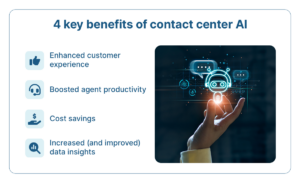Contact centers face unprecedented pressure managing sometimes hundreds of thousands of daily customer interactions across multiple channels. Traditional approaches, with their rigid legacy systems and manual processes, often buckle under these demands, leading to frustrated customers and overwhelmed agents. This was certainly the case during the past few years, when many platforms and processes collapsed under the weight of astronomical volumes due to natural disasters and other unplanned events.
So we set out to build a solution to tackle these pressures.
Our solution? Contact center AI – an agentic AI-based solution that transforms how businesses handle customer support.
In this article, I will give you a lay of the contact center AI land. I’ll explain what it is and how it’s best used, as well as ways to start implementing it.
What is contact center AI?
Contact center AI represents a sophisticated fusion of artificial intelligence and machine learning technologies designed to optimize every aspect of customer service operations. It’s more than just basic automation—it’s about creating smarter, more efficient systems that enhance both customer and agent experiences.
This advanced technology incorporates tools like Large Language Models (LLMs), which allow it to understand and respond to customer queries in a conversational and human-like manner. It also leverages real-time transcription, allowing customer interactions to be recorded and analyzed instantly, providing actionable insights for improving service quality. Additionally, intelligent task automation streamlines repetitive tasks, freeing agents to focus on more complex customer needs.
By understanding customer intent, analyzing context, and processing natural language queries, contact center AI can even make rapid, data-driven decisions to determine the best way to handle every interaction.
Whether routing a customer to the right department or providing instant answers through AI agents, this technology ensures a more dynamic, responsive, and efficient customer service environment. It’s a game-changer for businesses looking to improve operational efficiency and deliver exceptional customer experiences.
AI-powered solutions for contact center challenges
1. Managing high volumes efficiently
During peak periods, managing high customer interaction volumes can be a significant challenge for contact centers. This is where contact center AI steps in, offering intelligent automation and advanced routing capabilities to streamline operations.
AI-powered systems can automatically deflect routine inquiries, such as negative value, redundant conversations—like ‘where’s my order?’ or account updates—to AI agents that provide quick and accurate responses. This ensures that customers get instant answers for simpler questions without wait.
Meanwhile, human agents are free to focus on more complex or sensitive cases that require their expertise. This smart delegation not only reduces wait times, but also helps maintain high customer satisfaction levels by ensuring every interaction is handled appropriately. Each human agent has all the information gathered in the interaction at the start of the conversation, eliminating repetition and frustration.
2. Real-time AI to empower your agents
Injecting generative AI into your contact center empowers human agents by significantly enhancing their efficiency and effectiveness in managing customer interactions. These AI systems provide real-time assistance during conversations, suggesting responses for agents to send, as well as taking action on their behalf when appropriate—like adding a checked bag to a customer’s flight.
This gives agents the time to focus on issues that require human judgment, reducing the effort and time needed to resolve customer concerns. The seamless collaboration between AI and human agents elevates the quality of customer service, boosts agent productivity, and enhances customer satisfaction.
3. Improving complex case routing
Advanced AI solutions now integrate into various systems to streamline customer service operations. These systems analyze multiple factors, including customer history, intent, preferences, and the unique expertise of available agents, to match each case to the most suitable representative. Then, AI can analyze call data in real time, continuously optimizing routing processes to further enhance efficiency during high-demand periods.
By ensuring the right agent handles the right query from the start, these AI-driven systems significantly enhance first-call resolution rates, reduce wait times, and improve customer satisfaction. This not only boosts operational efficiency, but also fosters stronger customer loyalty and trust in the long term.
4. Enabling 24/7 customer support
Modern consumers expect round-the-clock support, but maintaining a full staff 24/7 can be both costly and impractical for many businesses—especially if they require multilingual global support. AI-powered virtual agents step in to bridge this gap, offering reliable and consistent assistance at any time of day or night.
These tools are designed to handle a wide range of customer inquiries, all while adapting to different languages and maintaining a high standard of service. Additionally, they can manage high volumes of inquiries simultaneously, ensuring no customer is left waiting. By leveraging AI, businesses can not only meet customer expectations, but also enhance efficiency and reduce operational costs.
4 key benefits of contact center AI
Now that we’ve touched on what contact center AI is and how it can help businesses most, let’s go into the top benefits of implementing AI in your contact center.

1. Enhanced customer experience
AI is revolutionizing the customer experience through multiple transformative capabilities. By providing instant response times through always-on AI agents, customers no longer face frustrating queues or delayed support. These agentic AI agents deliver personalized interactions by analyzing customer history and preferences, offering tailored recommendations and maintaining context from previous conversations. And all this context is available to human agents, should the issues be escalated to them.
Problem resolution becomes more efficient through predictive analytics and intelligent routing, ensuring customers connect with the most qualified agents for faster first-call resolution.
The technology also maintains consistent service quality across all channels, offering standardized responses and multilingual support without additional staffing, even during peak times. AI takes customer service from reactive to proactive by identifying potential issues before they escalate, sending automated reminders, and suggesting relevant products based on customer behavior.
Perhaps most importantly, AI enables a seamless customer experience across all channels, maintaining conversation context across multiple touch points and facilitating smooth transitions between automated systems and human agents. This unified approach creates a more efficient, personalized, and satisfying customer experience that balances automated convenience with human expertise when needed.
2. Boosted agent productivity
AI automation significantly enhances agent productivity by taking over time-consuming routine tasks, such as call summarization, data entry, and follow-up scheduling.
By automating these repetitive processes, agents can save significant time, giving them more freedom to engage with customers on a deeper level. This shift allows agents to prioritize building meaningful relationships, addressing complex customer needs, and delivering a more personalized service experience, ultimately driving better outcomes for both the business and its customers.
3. Cost savings
Organizations can significantly cut operational expenses by leveraging automated interactions and improving agent processes. Automation allows businesses to handle much higher volumes of customer inquiries without the need to hire additional staff, reducing labor costs.
Optimized processes ensure that agents are deployed effectively, minimizing downtime and maximizing productivity. Together, these strategies help organizations save money while maintaining high levels of service quality.
4. Increased (and improved) data insights
Analytics into AI performance offers businesses a deeper understanding of their operations by delivering actionable insights into customer interactions, agent performance, and operational efficiency.
These data-driven insights help identify trends, pinpoint areas for improvement, and make informed decisions that enhance both service quality and customer satisfaction. With continuous monitoring and analysis, businesses can adapt quickly to changing demands and maintain a competitive edge.
Implementation tips to start your contact center AI
If you want to add AI to your contact center, there are a handful of important decisions you need to make first that’ll determine your approach. Here are the most important ones to get you started.
1. Define your business objectives
Begin by assessing specific challenges and objectives, so that you can identify areas where automation could have the most significant impact later on—such as streamlining processes, reducing costs, or improving customer experiences.
Consider how AI can address these pain points and align with your long-term goals, but remember to start small. You just need one use case to get going. This allows you to test the solution in a controlled environment, gather valuable insights, and identify potential challenges.
2. Identify the best touch points in your customer journey
After you define your business objectives, you’ll want to identify the touch points within your customer journey that are best for AI. Within those touch points are End User Stories that will help you determine the data sources, escalation and automation paths, and success metrics that will lead you to significant outcomes. Our expert team of AI Engineers and Program Managers will help you map out the correct path.
3. Decide how you’ll acquire your AI: build, buy, or buy-to-build?
When choosing AI solutions, ensure they align with your organization’s size, industry, and specific requirements. Look at factors such as scalability to accommodate future growth, integration capabilities with your existing systems, and the level of vendor support offered.
It’s important to consider the solution’s ease of use, cost-effectiveness, and potential for customization to meet your unique needs. Another critical factor is observability, so you can avoid “black box AI” that’s nearly impossible to manage and improve.
You’ll also need to evaluate whether it’s best to buy an off-the-shelf solution, build a custom AI system tailored to your needs, or opt for a buy-to-build approach, which combines pre-built technology with customization options for greater flexibility.
4. Prep for human agent training at the outset
Invest in robust training programs to equip agents with the knowledge and skills needed to work effectively alongside AI tools. This includes developing expertise in areas where human input is crucial, such as managing complex emotional situations, problem-solving, and building rapport with customers.
5. Plan for integration and compatibility
Remember: Your AI will only be as good as the data and systems it can access. Verify compatibility with your existing systems, like CRM, ticketing platforms, or live chat tools. Integration to these systems is critical to the success of your contact center AI solution.
You also want to plan how AI will seamlessly integrate into human agents’ daily tasks without disrupting their workflows, and include all data within your project scope.
6. Establish monitoring and feedback loops
Before making any changes to your contact center, benchmark KPIs like first-call resolution, average handling time, and customer sentiment. Then regularly update and retrain the AI based on human agent and customer feedback to experiment and make the most critical changes for your business.
7. Plan for scalability
Implement AI solutions in phases, beginning with just one or two specific use cases. Look for solutions designed to help your business scale by accommodating different communication channels and adapting to evolving technologies.
By focusing on skills that complement AI capabilities, agents can provide a seamless, empathetic, and personalized experience that enhances customer satisfaction.
Final thoughts on contact center AI
Contact center AI represents a true organizational transformation opportunity in customer support, offering unprecedented ways to improve efficiency while enhancing customer experiences. Rather than replacing human agents, it empowers them to work more effectively, focusing on high-value interactions that require emotional intelligence and complex problem-solving skills.
The future of customer support lies in finding the right balance between automated efficiency and human touch. Organizations that successfully move from a conversational AI contact center to fully generative AI experiences will see significant lifts in key metrics and will be well-positioned to meet evolving customer expectations.



